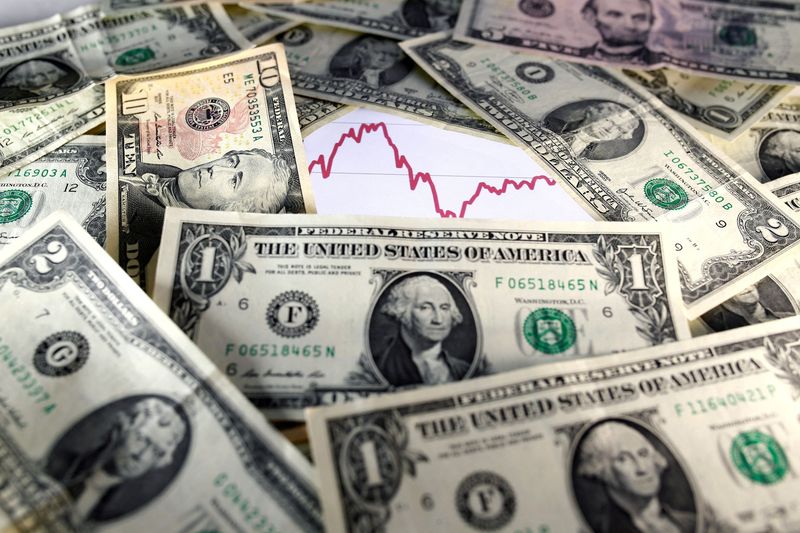 © Reuters. FILE PHOTO: U.S. dollar notes are seen in front of a stock graph in this November 7, 2016 picture illustration. REUTERS/Dado Ruvic/Illustration/File Photo
© Reuters. FILE PHOTO: U.S. dollar notes are seen in front of a stock graph in this November 7, 2016 picture illustration. REUTERS/Dado Ruvic/Illustration/File Photo
By Kevin Buckland
TOKYO (Reuters) - The U.S. dollar sank to a one-month low versus major peers on Friday as traders lowered Federal Reserve rate hike expectations amid signs the central bank might slow or even pause its tightening cycle in the second half of the year.
The dollar index, which measures the greenback against a basket of six major peers, fell as low as 101.43 for the first time since April 25. A rally in Asian stocks also sapped demand for the greenback as a haven.
Against the euro, the U.S. currency also slipped to the weakest since April 25 at $1.0765, and dropped to the lowest against sterling since April 26 at $1.2607.
The risk-sensitive Australian dollar rallied 0.51% to $0.7136, while the New Zealand dollar jumped 0.49% to $0.6510.
The dollar index is headed for a 1.5% drop this week, following last week's 1.37% slide. That would be the first two-week decline since the turn of the year.
It reached a nearly two-decade peak above 105 mid-month, but retreated amid signs that Fed tightening may already be slowing economic growth. Treasury yields have also dropped from multi-year highs, further undermining the dollar.
The dollar weakened 0.3% to 126.69 yen, sliding gradually over the past three weeks from a two-decade high of 131.35.
"U.S. inflation expectations have been coming off, so that's contributed to fading expectations for Fed tightening, which has weighed on the dollar, particularly dollar-yen, which is quite sensitive to yield differentials," said Shinichiro Kadota, senior FX strategist at Barclays (LON:BARC) in Tokyo.
"I think dollar-yen has peaked for now, but medium-term it will depend on inflation."
Minutes from the Fed's May meeting, released Wednesday, showed that most participants believed 50 basis-point hikes would be appropriate at the June and July policy meetings, but many thought big, early hikes would allow room to pause later in the year to assess the effects of that policy tightening.
Better risk sentiment did not help bitcoin however, which slipped 0.9% to around $28,908, continuing this week's gradual decline from the psychological $30,000 level.

